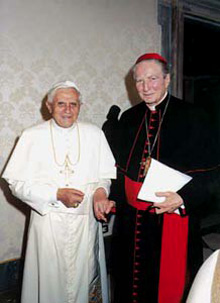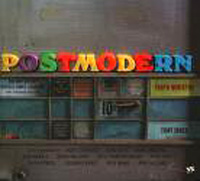 |
NEWS: May 30, 2008
Bird’s Eye View of the News
Atila Sinke Guimarães
A GLIMPSE OF THE POST-MODERN CHURCH – Cardinal Carlo Maria Martini, retired Archbishop of Milan, recently published an article in the Jesuit magazine America that is worthy of analysis. As one knows, Martini is one of the more intelligent and outspoken Progressivist leaders still alive today. Tactful enough to maintain good relations with the conciliar Popes and highly regarded by the ecclesiastical establishment, he, nevertheless, often sets forth the general lines the Church should follow to fulfill the agenda of Progressivism.

Benedict greets Martini for his 80th birthday |
Last year he made headlines stating the Church should open its doors to euthanasia. Prior to that, he suggested that Benedict XVI take new steps in ecumenism to move toward a Pan-religion. Even before that, he was one of the main voices clamoring for a more extensive application of collegiality to diminish the role of the Papacy, and calling for a Vatican III to achieve what Vatican II did not accomplish.
In this recent article, he deals with the post-modern world to which the Catholic Church, or better said the Conciliar Church, must adapt.
Abolition of thoughts
Martini, as happens frequently among Jesuits, takes a Hegelian approach to define what he imagines to be the post-modern world that is germinating in the minds of the youth. He states: “A post-modern mentality could be defined in terms of oppositions: an atmosphere and a movement of thought that stands opposed to the world as we have known it until now” (America, May 12, 2008, pp. 16-20).
One might surmise that he is criticizing the modern world as we know it today, so that an opposition to it would mean a return to past eras where logic reigned. This is not the case. The Cardinal eliminates this possibility with his next phrase: “This mentality willingly distances itself from metaphysics, Aristotelianism, the Augustinian tradition and from Rome as the center of the Church.”
Thus, no more abstract philosophy with its norms, no more Thomism, a name Progressivists hate to use and include in the more general term of Aristotelianism. The tradition of St. Augustine, who represents the good side of Platonism, can also be discarded. In just one sentence, Martini boots out of the post-modern mentality any philosophical school of the past - be it Thomist or Augustinian, Aristotelian or Platonist. Further, he adds a Protestant note: Such a mentality is opposed to Rome, or at least to Rome as the center of the Church.
In this last statement, one can discern the Progressivist agenda: the Church must become polycentric; a type of mini-pope should govern each Continent or cultural area.
L’imagination au pouvoir [Imagination rules]
The Jesuit theologian continues to sketch his future world: “This mindset keeps its distance from a platonic Christian world, in which it was taken for granted the primacy of the truth and values over feelings, of intelligence over the will, of the spirit over the flesh, of unity over pluralism, of asceticism over life, of the eternal over the temporal.”

Paris, May '68: Students revolt against all established order |
In these four lines Martini turns the entire civilized world on its head. Indeed, he understands “platonic” no longer as a school of thought, but as a synonym of unrealistic. So, the new world to come, which he approvingly depicts, would call for a complete revolution. A kind of ideological guillotine should chop off the heads of these “nobles” - truth, values, intelligence, spirit, unity and asceticism – to open the way to the dictatorship of these revolted “proletarians” - feelings, flesh, pluralism, and the temporal life. What he proposes is nothing less than a French Revolution added to a Communist Revolution inside the soul of man...
It is forbidden to forbid
After all these hierarchies are destroyed, what comes next? Martini continues the description of his utopia, placing himself inside this new world: “In our world there is a spontaneous preference for feeling over the will, for impressions over intelligence, for an arbitrary logic and the search for pleasure over an ascetic and prohibitive morality. This is a world in which sensitivity, emotion and the present moment come first.”

Postmodern: a new name for old libertarian dreams |
I stress that he is not referring to that old obtuse Positivism upon which modern science is based. For that Positivism, experience was the only reality. Therefore, it opposed metaphysical and moral principles as unreal: they would not be based on the “positive experience” of reality. This is not what the post-modern world wants, according to the Cardinal. For this new world, Positivism is as obsolete as all the other systems simply because it is a system, and nothing can be systematized. Everything has to be arbitrary and spontaneous.
Martini has still more to say: “Human existence, therefore, is a place where there is freedom without restraints, where a person exercises, or believes he can exercise, his personal empire and creativity.”
These are the main characteristics that Cardinal Carlo Martini imagines to be present in the minds of today’s youth. I positively disagree with him. Everywhere we see youth taking a conservative position, more conservative than their parents. But I will leave this point to refute at another time.
Here, I would just like to note that now, in May 2008, 40 years after the May 1968 Sorbonne Revolution, we have a Jesuit Cardinal who pretends to describe a novelty - a new world to come - when in fact he is repeating the exact same libertarian and anarchical principles that inspired that revolutionary movement, which in the United States took on the hippy form. Indeed, when Martini pretends to offer a first draft of the future, he is just reformulating the Sorbonne slogans: Death to reason; It is forbidden to forbid; Imagination rules; Make your dreams the reality, etc.
The kiss of Progressivism to Anarchism

May '68: the red flags of Communism along with the black flag of Anarchism |
The Cardinal ends his article approving this supposedly pervasive mentality: “I do not mean to say that all of this is completely false. A great deal of discernment would be necessary to distinguish the true from the false …What I am saying is that this mentality is everywhere, especially where there are young people, and it needs to be taken into account.
“And I say something more. Perhaps this situation is better that the one that existed previously. Christianity has an opportunity to better show its character of challenge … of a religion linked to the life of the body and not only to the mind.”
I remember following the international news in 1968 and seeing the Sorbonne Revolution rejected by the immense Gaullist majority of French people, who went into the streets to protest against those strikes and riots that were leading the country into chaos. Those mainstream demonstrations appeared to be a victory of the bourgeoisie over the rebels. On this subject Prof. Plinio Corrêa de Oliveira, my mentor, commented to some of his disciples including myself: “Pay attention, these revolutionary principles of May ‘68 will take refuge inside the sacristies, and from there they will return and come to dominate.” Actually, the Cultural Revolution of 1968 would never have been able to conquer the West as it did if Catholic teaching had not changed regarding society and customs.
Today, those ideas have come to dominate the customs in the West, but they still have not conquered the minds. So, to break this resistance, we see a famous Jesuit Cardinal and a good friend of Benedict XVI trying to present those revolutionary principles as a consummate fact and proposing that the Church adapt to them as a “sign of the times” of the future.


Related Topics of Interest
 Vatican III or Jerusalem II? Vatican III or Jerusalem II?
 Benedict's Surprises for the Future Benedict's Surprises for the Future
 Martini Favorable to Euthanasia Martini Favorable to Euthanasia
 Neo-Tribalism at Youth Days in L.A. Neo-Tribalism at Youth Days in L.A.
 WYD - From Catholicsm to Counter-Church WYD - From Catholicsm to Counter-Church
 Is Benedict Weakening the Papacy Is Benedict Weakening the Papacy
 Revolution and Counter-Revolution Revolution and Counter-Revolution

|
News | Home | Books | CDs | Search | Contact Us | Donate

©2002- Tradition in Action, Inc. All Rights Reserved
|
 |
|